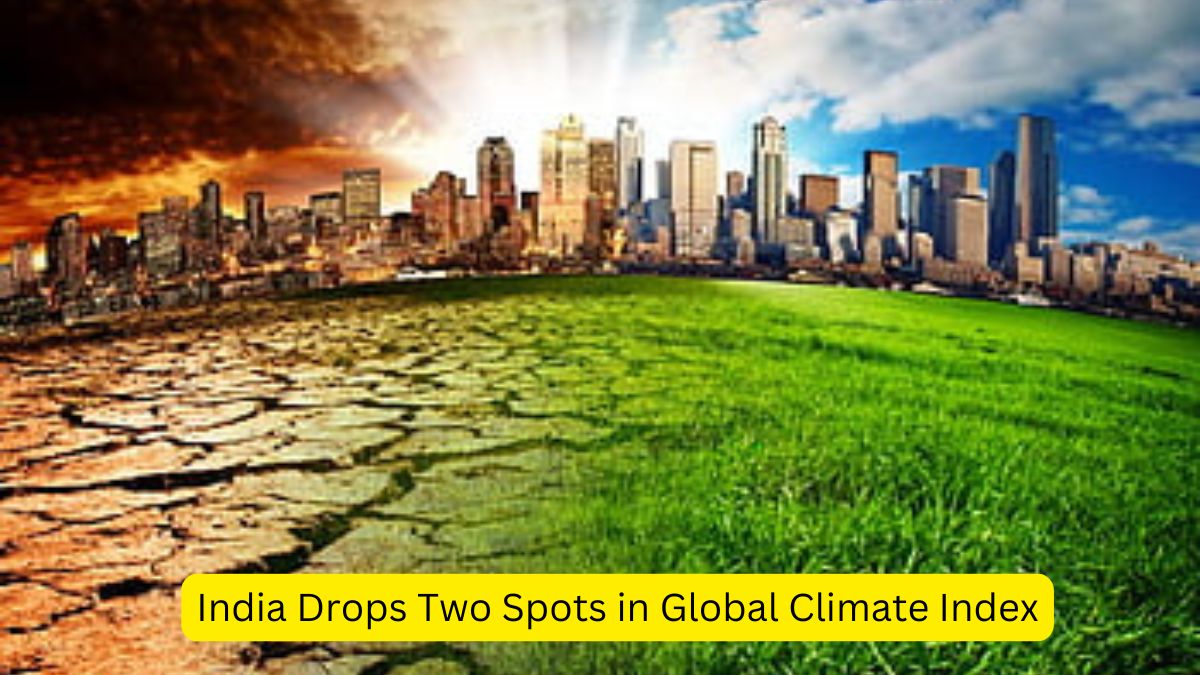India has maintained its position as one of the top 10 performers in the Climate Change Performance Index (CCPI) 2025, despite slipping two spots compared to last year. The report highlights India’s commendable efforts in reducing per-capita emissions and its accelerated adoption of renewable energy. Published by Germanwatch, New Climate Institute, and Climate Action Network International, the CCPI assesses 63 countries and the European Union, which collectively contribute to 90% of global emissions.
Key Highlights from the Report
India’s Performance
Rank: 10th out of over 60 countries in CCPI 2025.
Strengths
- Low per-capita emissions (2.9 tons CO2e compared to the global average of 6.6 tCO2e).
- Rapid progress in renewable energy, including large-scale solar projects and the Rooftop Solar Scheme.
- Advances in electric vehicle (EV) deployment, particularly in the two-wheeler segment.
- Improvements in energy efficiency standards.
Challenges
- Heavy reliance on coal, with plans to increase production due to large reserves.
- Growth-oriented climate approach driven by rising energy demands from industrial and population growth.
Commitments
- Net-zero emissions target by 2070.
- Aim to install 500 GW of renewable energy capacity by 2030.
Global Rankings and Trends
Top Performers
- Denmark (4th), the Netherlands (5th), and the UK (6th) lead the index.
- The UK climbed significantly due to coal phase-out policies and commitments to halt new fossil fuel projects.
Lowest Performers
- Iran (67th), Saudi Arabia (66th), UAE (65th), and Russia (64th) are at the bottom, attributed to high dependency on oil and gas.
- China (55th) and the US (57th) remain among the largest emitters with inadequate climate targets.
Argentina: Significant drop (59th) due to its president’s climate denial stance.
Global Context
- The top three positions in CCPI 2025 are vacant as no country achieved a “very high” performance.
- The 63 countries assessed, along with the EU, contribute 90% of global emissions.
- Denmark’s leadership reflects progressive policies for transitioning away from fossil fuels.
| Summary/Static | Details |
| Why in the news? | India drops two places but remains among top 10 climate performers: Report |
| India’s Rank | 10th out of over 60 countries |
| Strengths | – Low per-capita emissions (2.9 tCO2e, below global average of 6.6 tCO2e)
– Rapid renewable energy growth (e.g., solar projects, Rooftop Solar Scheme) – Advancements in EV deployment, especially two-wheelers – Improved energy efficiency standards |
| Challenges | – Heavy reliance on coal with plans to increase production
– Growth-oriented approach driven by rising energy and industrial demand |
| Global Commitments | – Net-zero emissions by 2070
– 500 GW renewable energy capacity by 2030 |
| Global Context | – Top 3 CCPI spots left vacant due to no country achieving “very high” performance
– 63 countries and EU assessed, contributing 90% of global emissions |
| Top Performers | – Denmark (4th), Netherlands (5th), UK (6th) |
| Lowest Performers | – Iran (67th), Saudi Arabia (66th), UAE (65th), Russia (64th) |
| China and US Rankings | China (55th) and US (57th) due to heavy coal dependency and weak targets |
| Argentina’s Decline | Rank 59th due to new president’s climate denial stance |
| India’s Climate Approach | Growth-driven, reflecting industrial and population energy demands; need for transition away from fossil fuels |



 Top 10 Richest People in the World 2026:...
Top 10 Richest People in the World 2026:...
 Top 10 Most Popular Websites of 2026: Go...
Top 10 Most Popular Websites of 2026: Go...
 Top 10 Most Valuable Technology Brands i...
Top 10 Most Valuable Technology Brands i...








